-
EQUILIBRIUM/L'EQUILIBRIO (Vincenzo Marra 2017)
VINCENZO MARRA: EQUILIBRIUM/L'EQUILIBRIO (2017)
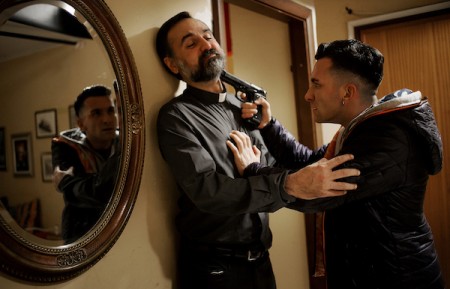
MIMMO BARELLI, GIUSEPPE D'AMBROSIO IN EQUILIBRIUM
Small victories that count
In the calm, polished world of contemporary Italian cinema, Vincenzo Marra's feature Equilibrium/L'Eqilibrio is an exhilaratingly angry movie. Shot with limited means and mostly non-professional actors, it concerns a priest whose quiet struggle for what is right is none the less noble and significant for being largely frustrated. Whatever happens, he has dared to take action against what he sees is wrong. Marra feels that people don't care any more, that we have given up the struggle against the worst powers that be, are dominated by fear of practically everything, and that the gangster forces that dominate his native Naples are nothing compared to the evil rule of the rest of Italy, the north, America, and the world. Father Giuseppe tries, and his path is one the director has frankly talked about as "Christ-like." The modest, understated but incisive The Equilibrium is the most exciting film I have seen in the Lincoln Center Italian film series this year. Its intensity is underlined by the way it follows its protagonist around constantly in a continual series of long single takes, documentary-style.
Father Giuseppe (Mimmo Borrelli, projecting quiet steadfastness) has been a missionary in Africa, and when first encountered, is working to help and protect refugees as part of his work at a small diocese in Rome. He decides to seek reassignment, and quickly gets it, after he feels his vocation is in danger when his relationship with a female coworker has become too emotional: she has confessed to being in love with him and he also has feelings for her. He is sent to a larger parish on the outskirts of Naples, to his native Campania, where he comes from.
Father Giuseppe arrives back at the land of Camorra-sanctioned waste mismanagement chronicled in the film Biutiful Cauntri (Open Roads 2008) - where the constant mindless burning of toxic waste has caused Italians to call the region La terra dei fuoci, the land of fires. This is an area where order is maintained not by government but by La Camorra, the local Mafia. (The situation was also chronicled in the Open Roads 2007 fllm See Naples and Die and in Roberto Saviano's book on which Matteo Garrone's Cannes Grand Prix-winning film Gomorrah was based.)
Father Giuseppe comes to replace a veteran cleric, Don Antonio (Roberto Del Gaudio, convincing as a glib fake), who has been and remains outspoken against the industrial waste problem in the area. Don Antoino seems like a good guy. He talks about the waste issue and about "speaking out" to his congregation, and he points out the burning garbage to Giuseppe. But Father Antonio turns out not really to be one for doing anything. Quite the contrary, though he tells Giuseppe when he leaves to get in touch if there is any problem.
The story hereafter focuses on particulars. It turns out the waste issue was a safe one. Objection to it is widespread and responsibility is diffuse. Such is not the case for wrongs Father Giuseppe meets. The first thing he runs into is that kids, including Davide, the altar boy, are playing ball in the street while the parish playing court is occupied by a tethered goat that is locked in. When he asks the nun who works at the parish she says this is because the owner of the goat is "a very important person." His effort to set this situation to rights and tie the goat outside are the first thing that arouses he disapproving gaze of the local Camorra.
The statistics on cancer and other illnesses from the toxic waste and fires are appalling. He goes to a hospital to visit a woman dying of cancer (Astrid Meloni) who begs him to persuade her son Saverio (Giuseppe D’Ambrosio) to see her. Eventually Giuseppe persuades the unwilling Saverio to visit his mother and in doing so he learns the young man's job.He stands guard with a whip in an abandoned building where addicts do their drugs. Why not a better job? Because there aren't any, and straight jobs don't pay anything. The arrangement is to protect Camorra drug interests: if the addicts used in a public, unguarded place, it would draw in the police and interfere with the drug trade.
The same apples when a more serious issue arises after a parishioner, Assunta (Francesa Zazzera), comes not to confess but to chat. She suspects that her boyfriend is abusing her daughter, and this may be widespread in her building. Nobody can say anything about this because the building is a center for the drug trade, and bringing in the police would jeopardize it.
When Giuseppe calls in Don Antonio, he scoffs and says Assunta is crazy, having delusions caused by anti-psychotic medication. The nun is scornful of Giuseppe's action on the goat occupying church space. He should leave things the way they are, she says sourly. That is the proper way to behave.
Don Giuseppe persists with Saverio and with Assunta. He has Assunta's daughter tested and a doctor certifies that she has been used sexually, which he presents to the police. This leads to his being roughed up by Camorra toughs and threatened with a pistol. They send Saverio to threaten him, and then rub Saverio out. Has Don Giuseppe caused Saverio's death? Perhaps; but the pressure not to make waves, to maintain "equilibrium," the status quo, is clearly for Don Giuseppe unacceptable. The death of Saverio is only a small sign of the insignificance of human life to the Camorra. Eventually Don Giuseppe is removed and Don Antonio comes back, taking over the parish again. Finally all Don Giuseppe is able to do is save Assunta and her daughter. But he leaves an honorable man, and Don Antonio is revealed to be a scoundrel.
In his Variety review from Venice, Boyd van Hoeij is approving of this film but points out that it films about the "far-reaching influence" of the crime syndicates in the Italian South "are many," and that Marra "isn’t working on the scale or with the virtuosity of people like Gomorrah’s Matteo Garrone or someone like Paolo Sorrentino." He also says some of the non-actors are less convincing than ones Marra used in a previous film. This may be true, but Equilibrium has a specificity and conviction not found in those more impressive works. There is something austere and relentless here that strikes home.
When this was screened at Lincoln Center director Vincenzo Marra was impressive for his passion and his modesty. He began by saying that the opening trailer for the upcoming Visconti retrospective made him think that we should all just go to lunch (it was a 1 p.m. showing). On the other hand he made clear that he remains convinced of the value of small but sincere films like this one about important things - that small inroads on big wrongs have true value.
Equilibrium/L'Equilibrio, 90 mins., debuted a Venice 5 Sept. 2017. opening theatrically in Italy (typically, very briefly, as Marra pointed out), distributed locally by Warner Bros., a fortnight later; it also was shown at London, Busan, and Buenos Ares. It was screened for this review as part of the 2018 Open Roads: New Italian Cinema series at Lincoln Center.
Showtimes (Walter Reade Theater)
Q&A with Vincenzo Marra on June 3
June 3 -1:00 PM
June 6 - 4:30 PM
Last edited by Chris Knipp; 06-03-2018 at 09:46 PM.
-
FORTUNATA (Sergio Castellitto 2017)
SERGIO CASTELLITO: FORTUNATA (2017)
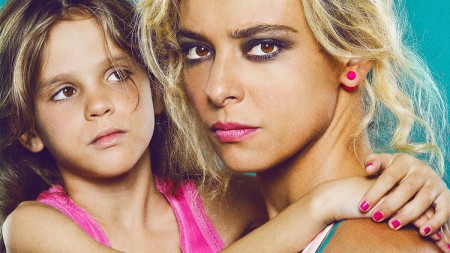
NICOLE CENTANNI AND JASMINE TRINCA IN FORTUNATA
Frantic Italian melodrama
In the veteran actor Sergio Castellitto's latest outing as a director, Jasmine Trinca (The Son's Room) plays the ironically named Fortunata ("Lucky"), a young mother and hairdresser living in the eastern outskirts of Rome trying to start her own beauty salon and neglecting her angry eight-year-old daughter Barbara (Nicole Centanni). The daughter's acting out - she spits, which later her mother says she's learning from her - leads mom to take her to Patrizio, a handsome psychotherapist, played by Stefano Accorsi (The Last Kiss, Romanzo Criminale). The treatment doesn't jell, but Fortunata and the shrink form an instant attraction. This foolish event seems the movie's central motive for action.
There are interesting and known actors. Fortunata's best friend, a bipolar tattoo artist drug addict, Chicano, is played by the hot new Italian star Alessandro Borghi (in two other Open Roads films this year, Naples in Veils and The Place), and Chicano's mother, a once famous German actress now in her dotage, is played byHanna Schygulla, in a very wasted role for such a distinguished performer. Fortnata's estranged, soon-to-be ex-husband Franco (Edoardo Pesce) is also lurking in the wings. In fact he enters the center stage regularly behaving in a threatening and sexually abusive way, by far the most unpleasant of these questionable individuals. Pesce is an actor powerful in projecting evil and menace, and is seen as a mean petty gangster in Matteo Garrone's new film debuted at 2018 Cannes, Dogman. Everyone is rampted up to high a pitch here, but he is particularly so.
No one quite lives up to their specifications in this rather disreputable group of individuals. Barbara scarcely gets to behave like a child. Fortunata is like a child, but hard to imagine as a hairdresser or performing any job, starting any business. As a psychotherapist, Patrizio mouths soothing generalities, but his goofy smiles do not inspire confidence in his seriousness. Even Chicano never really seems like much of a drug addict, nor a tattoo artist for anybody but Fortunata, nor even bipolar. He seems a beautific hippy with long hair and long beard, dressed in black, looking tanned and fit. Later "bipolar" seems to mean dangerously crazy.
Jay Weissberg called Fortunata "sloppily scripted" and "very Italian" in his Variety review at Cannes. He points out various weaknesses. There should be some explanation given for Fortunata sitting in on Barbara's therapy sessions, other than the opportunity for her and Patrizio to get turned on by each other."Fortunata confronts Patrizio, their eyes meet, and bang! the two start passionately smooching." Some filmmakers might be able to carry this off, but here somehow it becomes embarrassing. Clearly, it is exceptionally irresponsible of Fortunata to go off on a love idyll to Genoa with Patrizio and leave Barbara in the care of Chicano; it does lead to unfortunate consequences. Patrizio "must be one of the most ill-conceived psychologists in recent cinema," writes Weissberg, because "he makes so many unprofessional choices." He is the more repellant because he seems meant to be sympathetic.
But above all, as he notes, these characters and their actions have no depth - no deeper than the mugging and shouting and running around of the actors playing them. This is operatic drama, the reason why Weissberg calls it "very Italian," full of extreme emotions that do not convince and aren't clear.
I am not sure the uniformed Chinese woman doing morning exercises and dark-skinned muslims performing prayer out of doors express xenophobic sentiments. They may merely be included for colorful effect, in emulation of Sorrentino's symphonic sequences in La grande bellezza. I noted Weissberg's comment that as before Castellitto "inserts a wealth of songs at key 'mood' moments," but ineffectually.
Stephen Dalton expresses no higher opinion of this film in his Cannes Hollywood Reporter review. He noes that Castellitto is more known and respected for his 100+ film roles than for his by now six directorial outings with Margaret Mazzantini as writer. Castellinto may strive to emulate Pasolini's Mama Roma, which had the same location, or vintage Pedro Almodóvar, Dalton says, but Fortunata "ends up something of a soapy hot mess instead."
One remembers the choreographed rush and throbbing mild hysteria that make Gabriele Muccino's early films fun to watch, with their rhythmic movement and operatic surge. The craft was smoother and more retrained. It could be so because Muccino began with people similar to himself going through experiences he knew about: teenage milestones, turning thirty, midlife crisis.
Fortunata, 103 mins., debuted at Cannes 21 May 2017 in the Un Certain Regard section, where the star, Jasmine Trinca won Best Actress. It opened in French theaters 31 May. Nearly a dozen other festivals including Munich, Karlovy, Chicago, Warsaw and Belgrade. Screened for this review as part of the Open Roads: New Italian Cinema at Lincoln Center, Jun. 2018, the film's New York premiere.
Showtimes, Walter Reade Theater:
Friday, June 1, 6:15pm (Q&A with Jasmine Trinca)
Monday, June 4, 2:00pm
Last edited by Chris Knipp; 06-04-2018 at 06:17 PM.
-
LOOK UP/GUARDA IN ALTO (Fulvio Risuleo 2017)
FULVIO RISULEO: LOOK UP/GUARDA IN ALTO (2017)

Long smoke
The director of this film, Fulvio Risuleo, is 27. He was previously known for the shorts Lievito madre (2014) and Varicella (2015); the latter won the Discovery Award at Cannes. Look Up, Risuleo's inventive feature film debut, uses a young man's impulsive "fugue" across the rooftops of Rome as an entrée into a randomly discovered parallel universe - a world of fantasy and the imagination. As Gerardo Coelo wrote on Letterboxd Look Up is "truly enjoyable" and "plays like a children's adventure story for adults," and "is co incredibly inventive in the world it builds and the characters and situations that inhabit it, that the sheer joy of watching it, forgives any weaknesses (which it definitely has)." This is an inspired flight of Italian whimsy that shows us where Calvino came from.
The start of it all is a cigarette break on a rooftop in Rome taken by a young baker with Elvis hair, Teco (the appealing Giacomo Ferrara), who climbs up with two coworkers, when they all spy several extraordinarily large white seagulls, one of which crashes on a neighboring roof. Teco vows to take the day off and climb over to find out. He then finds companionship, romance, adventure, delicious and magical food, and other surprises, including a new destiny.
First off, an unusually articulate little girl (Alida Baldari Calabria) makes friends with Teco and shows him Carlo, a rooster she's cradling in her arms that she says is her "husband." Part of the charm of the film is the genuine surprise and amusement Giacomo Ferrara shows as events unfold, such as this absurdity. Later on when he meets Stella (Aurélia Poirier), the shipwrecked French lady pilot who has parachuted to the roof, there is a sequence of joyous playfulness between the two that is uniquely natural. The girl introduces Teco to a gang of kids in masks, including one who is mute, who is building a rocket ship - a project we will return to for an explosive finale.
Later Teco and Stella are pursued by a gang of disapproving nuns. But some of the nuns turn up carousing when night falls, and they enter a subterranean party. I could have done without the longeurs of this party: it is probably one of the "weaknesses" Gerardo Coelo alludes to. But, even though it is only an interlude, one might not wish to miss Teco's meeting with Baobab, played by the iconic Leo Castel, who's worked with Marco Bellocchio, Raul Ruiz, and Phlilippe Garrel, among many, and provides a strange, magical encounter, the feel of a real hermetic being, part of another world.
There is a DIY aesthetic that is essential to the imaginative stimulation of this film, but tech details are not a disappointment. The inventive storyline and charming acting provide most of our gratification. But from the start one is charmed by the retro computer/house/dub music by Cameron Stallones aka Sun Araw, available on vinyl in a double album, no less. The way thirty-one-year-old dp Juri Fantigrossi can make Teco's and Stella's climbing around in rooftop tunnels luminous and beautiful is miraculous. This is a movie Michel Gondry would like to have made.
Look Up/Guarda in alto, 90 mins., debuted at Rome, 29 Oct. 2017, also playing at Rotterdam, and was in Critics Week at Cannes 2018. Screened for this review as part of the Open Roads: New Italian Films series at Lincoln Center.
Showtimes, Walter Reade Theater:
June 3 - 8:30 PM
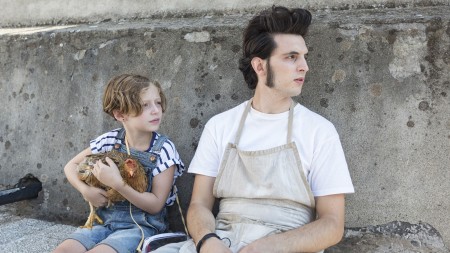
ALDA BALDARI CALABRIA AND GIACOMO FERRARA IN LOOK UP
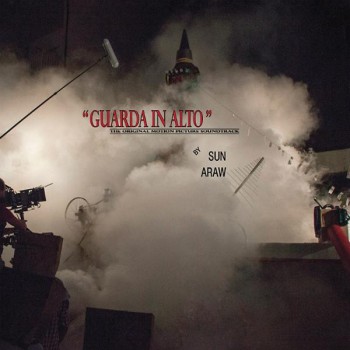
SUN ARAU ALBUM FOR GUARDA IN ALTO
Last edited by Chris Knipp; 06-05-2018 at 08:44 AM.
-
MARCO FERRERI: DANGEROUS BUT NECESSARY (Anselma Dell’Olio 2017)
ANSELMA DELL'OLIO: MARCO FERRERI: DANGEROUS BUT NECSSSARY/LA LUCIDA FOLLIA DI MARCO FERRERI (2017)
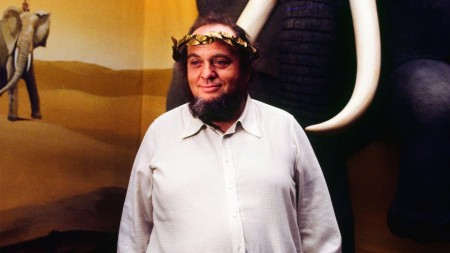
MARCO FERRERI
Marco Ferreri: A neglected Italian cinematic original
The direcor of La Grande Bouffe cut off an interviewer who asked him if he'd like to be rememered as a social critic or a visionary with "I don't want to be remembered at all." This documentary by Anselma dell"Olio points in the opposite direction, toward bringing him renewed recognition. While Fellini, Rossellini, Vinconti, De Sica et al. were recognized as masters, Ferreri (1928-1997) was an offbeat artist who did not seek a reputation as one of the great ones. He was an iconoclast, and original. In the world of Italian culture that seeks smoothness and good taste, Ferreri particularly stands out because he didn't try to fit in. Unfortunately, his unique work has been forgotten. This film acts as a corrective.
Dell'Olio is a film critic who also worked on set with Ferreri as a dialogue coach and adapter. She organizes the film by topics like film, food, flesh, eschewing a conventional voiceover, in order to give Ferreri the kind of presentation he deserves as a true original.
Roberto Benigni fitly praised and described Ferreri early on in a poem capitalizing on the filmmaker's short rotund look to describe him as a clown. Benigni starred in Ferreri's kindergarten comedy Seeking Asylum. Ferreri himself sometimes described himself as a "buffoon director." Ferreri worked a lot with notable French cinema figures - composer Philippe Sarde, actors Annie Girardot, Gérard Depardieu and Michel Piccoli. His father was a banker. Ferreri gave up his original plan of becoming a veterinarian but retained his love of animals, and humans' relationship with them, as reflected in The Ape Woman (included in the Open Roads Lincoln Center series his year, and to be covered here), and Bye Bye Monkey, about the discovery of the corpse of King Kong on a New York Beach. Sarde is heard from here as well as the director Radu Mihaileanu, the production designer Dante Ferretti, and Cahiers du Cinéma authority Serge Toubiana.
Sarde talks about Ferreri as a refined and delicate filmmaker, and we learn how he wa the favorite of the likes of Ornelia Buti and Anreaa Ferreol. He was able to engage Mastroianni, Tognazzi, Piccoli, and Philippe Noiret in his works.
Dell'Olio links Ferreri with Buńuel, Fassbinder and Pasolini as "archangels of destruction of resurrection." With this in mind, he is an Italian writer-director we need to know more about.
Marco Ferreri: Dangerous But Necessary/La lucida follia di Marco Ferreri, 77 mins, debuted at Venice 2017, where it was covered by Deborah Young in a Hollywood Reporter review . See also the summery for a 30 Jan. 2018 showing by New York Transatlantic, which gives further details. It was screened at Open Roads: New Italian Cinema in an evening of recognition of the forgotten director. Showtime: Showtimes June 5 -6:30 PM (Walter Reade Theater, Lincoln Center). This film is not currently i listed on IMDb. For her work with Ferreri the director is is listed there as Selma Dell'Olio.
Last edited by Chris Knipp; 06-06-2018 at 07:26 AM.
-
THE APE WOMAN (Marco Ferreri 1964)
MARCO FERRERI: THE APE WOMAN/LA DONNA SCIMMIA (1964)
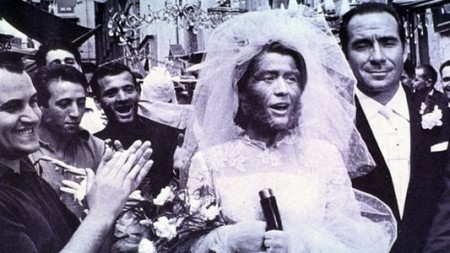
ANNIE GIRAUDOT AND UGO TOGNAZZI IN THE APE WOMAN
Funny creepy
Marco Ferreri's 1964 French-Italian production The Ape Woman/La donna scimmia is an odd combination of love story, horror story, and satire. It has some of the feel of the Italian comedies of the sixties, but it goes further, towards creepiness. In its story of a fairgrounds huckster and the woman he uses who loves him, it arouses obvious comparisons with Fellini's La Strada. But it's a different story. In fact, in the Bologna L'Immagine Ritrovata restoration with alternate endings, it's three stories. It's hard to know what to make of it. But it's impossible to overlook. It's one of the iconoclastic Italian director Ferreri's strange creations, brutal satire, full of Italian good humor.
Focaccia (Ugo Tognazzi) is a sleazy promotor who's enjoying a free meal in the kitchen of a Naples nunnery, when he discovers shy Maria (Annie Giraudot). When he presses and finds she's covered with soft hairs on body and face, his eyes light up with Lire signs. A series of tableau-like scenes follow, some personal, some public. Focaccia's whole effort is to exploit Maria as a freak. He pretends to have found her in a wild, ape-like state exploring in Africa, and builds a little wood cage for the shows. He teaches her to bare her teeth like a monkey and swing from a fake tree. But he can't have her with him unless he marries her. And so the wedding is one of the tableaux. It's done for publicity. Now Maria is no longer ashamed, and there are tears in her eyes as she's paraded through the street singing off-key. Her feelings are mixed, to say the least.
They are a circus-style working couple, and have a domestic life. She cooks for him. An orphan, raised in the nunnery, she learned to. After the wedding, she insists they sleep together, and they have a sex life. From the start, Focaccia is both nice and mean to her. He soothes her, saying she's "not so bad," and is affectionate. But then he takes her to a rich collector of monstrosities who, told that she's a virgin, wants to pay a large sum to have her to himself for a few days. Maria will have none of it, ending that deal. Tognazzi deserves our admiration for making the real monster, Focaccia, who will pimp out his own domestic partner and exploit her as a freak, bearable to watch, though our sympathies are always with Maria.
Things seem to be going pretty well (though Ferreri doesn't show the show-biz side of the story in much detail) when Maria gets pregnant. Another particularly creepy and compelling sequence follows when a tall, gangly young French doctor examines her for stomach pains and declares her to be pregnant, then insists that she must have an abortion. A little old domestic servant who acts as interpreter of the doctor's French is appalled, barely willing to utter the word "abortion" in Italian. The always sensible Maria will have none of this idea either.
The birth of Maria's child leads to the three endings: one sad, one repugnant, and one positive and happy. The sad ending is too abrupt and brutal and must have resulted from the censors objection to some aspects of the longer "Italian ending." Spoiler alert: here are the three endings.
In the late stages of Maria's pregnancy, there is a scene on a balcony in the nice Naples hotel where they are staying (they have dough from the "performances" even if it's going to run out soon: the hotel is paid up for the month). In it Maria touches her face, and some of the hairs are falling off. He reassures her that it's just part of pregnancy, and they'll grow back richer than ever when the baby's born. Then, after childbirth, Maria is on an oxygen tank, barely able to breathe. She is dying, and Focaccia lies to her that the baby is in an incubator doing fine, but we understand. In a brutally satirical moment, one of a set of observing doctors boasts that he can publish a good article about this.
The "unabridged Italian version" continues to show Focaccia reclaiming Maria's embalmed body from a museum, to use it as an attraction in his own circus freak show. And the state museum must turn it over, because she's his wife. A tableau of the show follows, with new details, including a male collaborator on the story of African exploration spouting learned fake Latinate phrases. This sequence is numbing.
Jump to the "French ending." Ferreri dies in French, and collaborated much with French cinematic artists. Why is this version so different, so positive? Did the filmmaker feel it was only the Italians who needed the prodding of cruel satire? Anyway, in this version, Maria does not die, nor does the baby, who is a healthy, completely normal boy, with head "as bald as an egg." She loses all her abnormal face and body hair, and becomes - the pretty Annie Giraudot, who has been lurking clearly behind the fake hair all along of course. Without the freak show wife, Focaccia complains he has no livelihood, and he fast runs out of money. He is pushed to go and work at the port. He resists, but eventually gives in. In the final tableau, a happy Maria comes to greet Focaccia after work down at the port, with their young son at her side, and pregnant again. Focaccia is making good money now, and all is well. All that strangeness is behind them. They are a normal, happy little family. As if all that came before was just a bad dream.
Produced by the impresario Carlo Ponti, The Ape Woman features the black and white cinematography of Aldo Tonti (Europa ’51, Nights of Cabiria, Barabbas) and is one of many Ferrerri collaborations wth his Spanish co-screenwriter Rafael Azcona, who wrote with him his most famous film, the all-star attack on consumerism La Grade Bouffe.
The Ape Woman/La donna scimmia, 92 mins., opened in Italian theaters Jan. 1964 and showed at Cannes 4 May 1964, and was nominated for the Palme d'Or. It opened in NYC Sept. 1964 (dismissive, abusive review by the Times' sometimes clueless Bosley Crowther). It released in France as Le Mari de la femme ŕ barbe. A digital restoration showed at Venice Sept. 2017, and this version was shown at Lincoln Center as part of Open Roads: New Italian Cinama, where it was screened for this review.
Showtime at Walter Reade Theater:
June 5 -8:45 PM
Last edited by Chris Knipp; 06-06-2018 at 10:54 AM.
-
PURE HEARTS/CUORI PURI (Roberto De Paolis 2017)
ROBERTO DE PAOLIS: PURE HEARTS/CUORI PURI (2017)
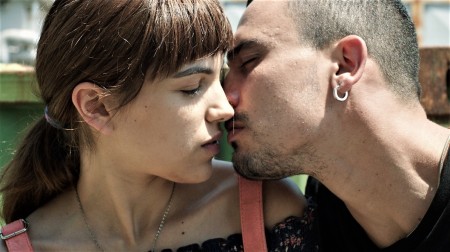
SILENE CARAMAZZA AND SIMONE LIBERATI IN PURE HEARTS
Tough stuff
In a fast, highly focused sequence that sets the tone for the whole movie, at the outset of Pure Hearts/Cuori puri a girl is chased and caught by a young man working as a security guard. She has stolen a cell phone from a mall. She begs him to release her and he relents, and lets her walk away with the phone.
She has not walked out of his life but into it. How can they resist each other's intensity? These two star-crossed lovers won't let each other go, and the stuff pulling at their lives won't, either. Nor can we resist this compelling first scene and its consequences. Cuori puri is a fiercely focused little movie that runs and won't let you go. The title refers to Christian doctrine, but the movie itself has a "pure heart" too. Equally important, it has a good plot built out of the simplest and knottiest of everyday issues.
The girl is Agnese (Silene Calamazza) and the young security guard is Simone (Simone Liberati). Agnese is 17, about to turn 18. She is part of a Christian school and community and lives with her single evangelical mom. She is slim and pretty. Stefano is 25, robust and good-looking, seething with repressed energy. The outcome of their encounter makes her deeply grateful to him, and arouses an attraction in him that almost immediately finds a strong echo in her. He's from the wrong side of the tracks. She's under unusually trying moral constraints.
Agnese's Christian mother Marta (Barbora Bobulova) is kind but worried and overprotective. The reason she stole the cell phone turns out to be that her mother has taken hers away and won't return it, thus cutting her off from her school friends. Marta has pressed Agnese to take a vow of chastity till marriage, and she has agreed. But evangelical principles aside, Marta's seizing of Agnese's cell phone for suggestive messages she insists the boys sent her unsolicited is a sign Marta can't adjust to having a teenage daughter. Marta's mistrust is the kind that spurs rebellion in any normal teenager.
Before long Agnese and Stefano run into each other again - they're in the neighborhood - and before you know it he's kissing her. He puts his number on her new stolen phone, and an intense back-and-forth relationship ensues. This, Agnese must hide from her mother, leading to a major deception when the attraction leads to consummation - a vivid first sex scene.
At the film's Cannes 2017 Directors' Fortnight debut Jay Weissberg wrote a review of the film for Variety and Harry Windsor wrote one for Hollywood Reporter. Windsor praised the film for dealing with issues (religious fundamentalism, the Roma population) without seeming didactic. Weissberg was encouraged to see a small, original movie getting a major push-off against a sea of bigger budgeted Italian "mediocrities." This is encouraging. Cuori puri may be the new Italian neorealism. There are so many issues here, but they count as nothing against the attraction of a young couple falling in love, the force of it keeping things real.
Letting Agnese go gets Stefano fired from the mall and leaves him now stuck with a tedious new job guarding a parking lot. It adjoins a camp of Roma - gypsies- who are constantly threatening to overrun the flimsy wire fence, and apart from this constant provocation Stefano is ill equipped to deal with, this is a dull, lonely job.
Stefano speaks full-on Roman dialect and grew up poor. It turns out that while lately he has been trying to make a living by honest means, he was part of a small-time gang headed by drug dealer Lele (Edoardo Pesce, also in Open Roads 2018 film Fortunata, as well as Garrone's Cannes prizewinner Dogman). Thanks to his deadbeat, formerly abusive father (Federico Pacifici) ) Stefano's parents are months behind in rent and about to be evicted. They will be forced to go and live in a trailer, which also can't last. This turn of events makes Stefano see his people are not much of a cut above the Roma, who Lele tells him have plenty of money, despite their "caravans." Lele observes Stefano's struggle with the parking lot mockingly.
A Stefano, Liberati is a live wire. His sheer power onscreen impresses without seeming too theatrical. The movie is anchored by the explosiveness of the scenes between Caramazzi and Liberati, even on a first date when they go to the beach - for which she has realistically prepared by shaving around her pubes. This seemingly little swim is not without a playful underwater scene, symbolically underlining how deep the pair is raidly going.
But the well constructed screenplay insures that the scenes in between are almost as good, even the group ones where the big, bearded young evangelist priest Don Luca (Stefano Fresi) teaches the group Agnese is also in. Though De Paolis means us to see there is purity outside rigid chastity, Don Luca is likable and his lessons sound sensible. (Likewise the Roma get, though at some remove, a fair shake.)
Pure Hearts, satisfyingly, gives you no time to think. It's not very clear how Marta supports herself and Agnese or what Agnese's life is like outside Don Luca's pep talks and Stefano's wooing. De Paolis invests heavily in intense, emotional scenes, with no time spent on background or atmosphere, but it works.
Pure Hearts/Cuori puri, 114 mins., debuted 23 May 2017 in Directors Fortnight at Cannes, showing in at least five other international festivals. It was screened for this review as part of Open Roads: New Italian Cinema 2018. Q&A with Roberto De Paolis on June 1.
Showtimes (Walter Reade Theater)
June 6 -2:00 PM
Last edited by Chris Knipp; 06-07-2018 at 05:44 AM.
 Posting Permissions
Posting Permissions
- You may not post new threads
- You may not post replies
- You may not post attachments
- You may not edit your posts
-
Forum Rules





 Reply With Quote
Reply With Quote







Bookmarks